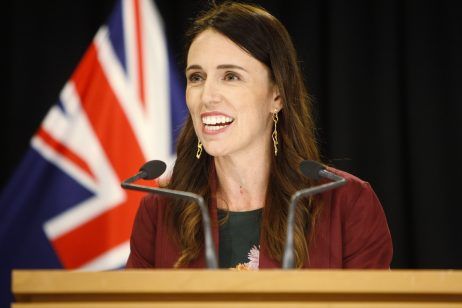Resurgence of COVID-19 potentially theatens New Zealand election date

A few minutes every morning is all you need.
Stay up to date on the world's Headlines and Human Stories. It's fun, it's factual, it's fluff-free.
After an impressive 102-day COVID-19-free streak, New Zealand is scrambling to trace and contain a new outbreak, reporting 14 new infections on Thursday.
“Once again we are reminded of how tricky this virus is and how easily it can spread,” said Prime Minister Jacinda Ardern during a televised news conference.
“Going hard and early is still the best course of action.”
Thursday’s new infections were all traced back to one family in Auckland through work or broader family connections. A further 200 people with connections to the family were contacted immediately.
Ardern, who had received praise over her stringent and controlled response during the early days of the pandemic, swiftly reimposed tight lockdown restrictions for an initial period of three days for greater Auckland.
“Our plan of mass testing, rapid contact tracing and, of course, our restrictions to stop the chain of transmission has been in full swing in Auckland today,” said Ardern.
She also warned that it is likely that “things will get worse before they get better,” urging the public to prepare for a further rise in infections.
On Wednesday, Auckland was moved to Alert Level 3, requiring all non-essential workers to stay home, and most bars, restaurants and businesses to close.
The rest of the country was moved to Alert Level 2, which places a 100-person limit on mass gatherings and requires people to practice social distancing.
These measures will stay in place until Friday when Ardern is expected to announce whether measures will be extended further to combat the outbreak in the coming few weeks.
Some believe that the source of the new outbreak came into New Zealand by freight, as one of the family members who tested positive works at a cold-storage facility that handles food imports.
Director-General of Health Ashley Bloomfield said, “We do know from studies overseas that actually, the virus can survive in some refrigerated environments for quite some time.”
However, others believe it is more likely that the virus had been quietly spreading through Auckland for weeks.
As the virus was seemingly eradicated after a strict initial lockdown when the country only had 100 cases, life had largely returned to normal in New Zealand. People were attending sporting games at packed stadiums, and visiting bars and restaurants without fear, giving way to concerns that the public had become complacent.
But the sudden appearance of new infections has temporarily cost those living in Auckland their freedoms.
New Zealand election ramifications
The unexpected resurgence of the virus comes ahead of New Zealand’s general elections, currently scheduled to be held in September.
While according to recent polls Ardern appears on track for an easy victory, the National Party is now calling for a delay in the vote, pointing to the unfair advantage enjoyed by Ardern as social distancing measures hindered its ability to campaign.
Under New Zealand law, the government can delay the election by up to two months but it must be held by November 21 to avoid constitutional issues.
Many of the opposition candidates’ upcoming campaign events have already been cancelled.
Ardern said that she will announce her decision on the election date by Monday at the latest, and that she was seeking advice about the options available moving forward.
“We can see the seriousness of the situation we are in,” said Arden, speaking on her deliberations about an extension of lockdown measures and the upcoming election.
“It’s being dealt with in an urgent but calm and methodical way.”
Have a tip or story? Get in touch with our reporters at tips@themilsource.com




Comments ()